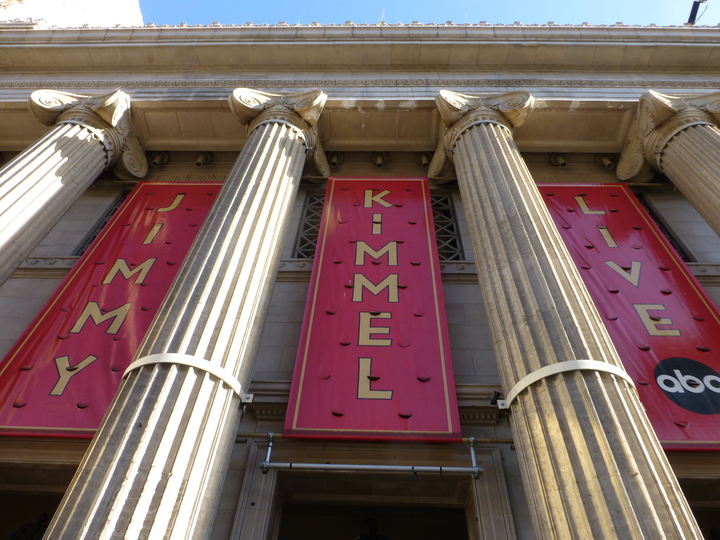WASHINGTON – Jimmy Kimmel returned to the air Tuesday night after Disney-owned ABC suspended the late-night show following his remarks on the assassination of conservative activist Charlie Kirk and Federal Communications Commission Chair Brendan Carr’s threats to the network.
In his opening monologue, Kimmel thanked fans and fellow talk-show hosts, including Stephen Colbert, Jimmy Fallon and Jon Stewart. He also made note of the support received from politicians such as Sen. Ted Cruz (R-Texas) and Sen. Rand Paul (R-Ky.), stating “it takes courage for them to speak out against this administration, and they did.”
Kimmel’s nearly weeklong suspension sparked intense backlash across the political spectrum and concerns over press freedom.
In a statement to Medill News Service, Rep. Judy Chu (D-Calif.) stated that “the Trump administration tried to silence a critic by abusing federal power, and a major network caved.”

Rep. Judy Chu (D-Calif.) speaking at a press conference organized by Rep. Laura Friedman (D-Calif.) outside the Jimmy Kimmel Live! studio in Hollywood. (Courtesy of the Office of Rep. Chu)
“That only changed because millions of Americans spoke out in defense of our constitutional right to free expression,” Chu said.
Disney’s decision on Sept. 17 to suspend the show indefinitely followed Carr’s comments on “The Benny Show,” a right-wing podcast. Carr called Kimmel’s remarks about Kirk the “sickest behavior I’ve seen yet” and stated “these companies can find ways to take action on Kimmel, or there is going to be additional work for the FCC ahead.”
Hours before ABC pulled the plug on Kimmel, local television station owners Nexstar and Sinclair announced that they would be pre-empting Jimmy Kimmel Live! with other programming.
Nebraska Republican Representative Don Bacon said in a statement that “the threats FCC Chair Carr made were a mistake” and “the Constitution does protect our speech from government restrictions,” but noted that “ABC and its affiliates have every right to make their own determinations.”
Kimmel’s suspension is another example of the Trump administration’s willingness to pressure media companies and take legal action against them. In December, ABC agreed to settle a defamation lawsuit brought by Trump for $15 million. In July, Paramount announced a $16 million settlement over the editing of a CBS News “60 Minutes” interview, a month before the FCC approved its $8 billion merger with media company Skydance.
Most recently, a judge dismissed a lawsuit against the New York Times, accusing the media platform of being a “leading, and unapologetic purveyor of falsehoods” against the President.
Trump’s efforts at media suppression have called into question the press’s ability to exercise free speech. But, according to Brent Skorup, a legal fellow at the Cato Institute, broadcasters are subject to different limitations.
“The Supreme Court held decades ago that, essentially, broadcasters do not have the full First Amendment rights that most media have,” Skorup said. “Because they use spectrum and are licensed by the FCC, it can investigate, including fail to renew and reject, license applications.”
Skorup noted that while Carr’s comments were a “violation of free speech norms,” the FCC is “fairly free to scrutinize content” under current law.
Carr later reiterated that Kimmel’s suspension was a result of programming decisions made by media companies.
ABC brought Kimmel back on air on Sept. 23, but the show did not run on Nexstar and Sinclair-owned stations.
Nexstar, which owns nearly 30 ABC-affiliated stations, is currently awaiting FCC approval on a roughly $6 billion merger with another local television station owner, TEGNA.
According to Skorup, there is a “long practice” of merging companies being sensitive to FCC concerns.
“Nexstar has to get approval from the FCC for the merger, and they actually have to get an exception to the current cap on ownership of stations,” said Stuart Benjamin, a professor of law at Duke University, specializing in the First Amendment.
“The concern is if [Nexstar] doesn’t do what Brendan Carr wants, then maybe the FCC doesn’t raise the caps or delays raising the caps by a couple of years,” Benjamin said. “And if you delay long enough, then you effectively prevent the transaction from happening.”
Skorup says Kimmel’s suspension could prompt wider conversation about free speech rules with respect to broadcasting, noting he’d “welcome” a lawsuit that would reevaluate those rules.
“It would be a great thing for the Supreme Court to recognize broadcasters as full-fledged members of the media with full First Amendment rights,” Skorup said. “But, for the parties who are in the best position to sue, like broadcasters, no regulated party is eager to sue the agency that licenses them.”

